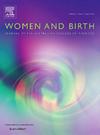探讨印度妇女对实施助产士主导护理的态度和信念:混合方法研究
IF 4.4
2区 医学
Q1 NURSING
引用次数: 0
摘要
问题尽管印度最近引入了助产服务以改善孕产妇和新生儿的医疗保健,但有关妇女对助产士主导的护理的看法的研究却很有限。背景印度政府于 2018 年启动了助产服务指南,以改善全国孕妇和新生儿的护理质量。本研究探讨了印度南部两个邦的妇女对实施助产士主导型护理的态度和信念。方法采用聚合混合方法设计,使用在线问卷和半结构化在线访谈。定量数据采用描述性统计方法进行分析,定性分析采用框架方法。共有 307 名妇女完成了在线调查,23 名妇女参加了深度访谈。研究结果表明,妇女对助产士主导的护理认识不足。尽管如此,仍有 60% 的妇女对其益处表示乐观。妇女接受的关键因素包括更好地了解结果、信任助产士、接受尊重的护理以及拥有决策自主权。讨论大多数参与者认为助产士主导的护理是有益的,她们重视助产士提供的技术娴熟、反应迅速和富有同情心的服务。结论本研究的观点对实施助产士主导的护理具有启示意义,实施助产士主导的护理应考虑生活在印度城市和农村地区的妇女及其家庭的信息需求、安全标准和文化背景。本文章由计算机程序翻译,如有差异,请以英文原文为准。
Exploring the attitudes and beliefs of women regarding the implementation of midwife-led care in India: A mixed methods study
Problem
Despite the recent introduction of midwifery services in India to improve maternal and newborn healthcare, there is limited research on women’s perspectives on midwife-led care.
Background
The Government of India initiated midwifery services guidelines in 2018 to improve the quality of care for pregnant women and newborns across the country. It is important to develop evidence-based strategies which can optimise the implementation of these new midwifery services.
Aim
This study explored women’s attitudes and beliefs towards the implementation of midwife-led care in two southern states of India.
Methods
A convergent mixed methods design was employed using an online questionnaire and semi-structured online interviews. Quantitative data was analysed using descriptive statistics and qualitative analysis used a framework approach. Data from both sources were then integrated through merging techniques.
Findings
A total of 307 women completed the online survey, and 23 participated in in-depth interviews. The study highlighted inadequate knowledge of midwife-led care among women. Despite this, 60 % expressed optimism about its benefits. Key factors to women’s acceptance included better understanding outcomes, having trust in midwives, receiving respectful care, and having autonomy in decision-making. They also required midwife-led birthing units would be clean, accessible, and well resourced.
Discussion
Most participants perceived midwife-led care as beneficial, valuing its skilled, responsive and compassionate services.
Conclusion
Insights from this study have implications for the implementation of midwife-led care which should consider the informational needs, safety standards and cultural contexts of women and their families living in both urban and rural areas of India.
求助全文
通过发布文献求助,成功后即可免费获取论文全文。
去求助
来源期刊

Women and Birth
NURSING-OBSTETRICS & GYNECOLOGY
CiteScore
7.20
自引率
13.20%
发文量
371
审稿时长
27 days
期刊介绍:
Women and Birth is the official journal of the Australian College of Midwives (ACM). It is a midwifery journal that publishes on all matters that affect women and birth, from pre-conceptual counselling, through pregnancy, birth, and the first six weeks postnatal. All papers accepted will draw from and contribute to the relevant contemporary research, policy and/or theoretical literature. We seek research papers, quality assurances papers (with ethical approval) discussion papers, clinical practice papers, case studies and original literature reviews.
Our women-centred focus is inclusive of the family, fetus and newborn, both well and sick, and covers both healthy and complex pregnancies and births. The journal seeks papers that take a woman-centred focus on maternity services, epidemiology, primary health care, reproductive psycho/physiology, midwifery practice, theory, research, education, management and leadership. We also seek relevant papers on maternal mental health and neonatal well-being, natural and complementary therapies, local, national and international policy, management, politics, economics and societal and cultural issues as they affect childbearing women and their families. Topics may include, where appropriate, neonatal care, child and family health, women’s health, related to pregnancy, birth and the postpartum, including lactation. Interprofessional papers relevant to midwifery are welcome. Articles are double blind peer-reviewed, primarily by experts in the field of the submitted work.
 求助内容:
求助内容: 应助结果提醒方式:
应助结果提醒方式:


